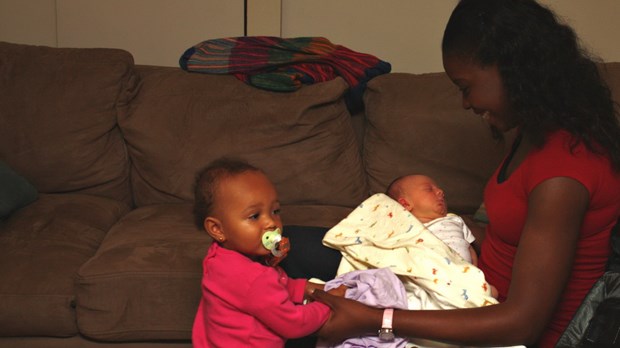Becoming the "New Mommy"

"Mommy, but I loooove this rainbow shirt!" my five-year-old daughter howled as we prepared to leave for church. "You always let me wear it before! You didn't care if I showed my belly then!"
"Cheyenne, we want to dress our best when we go to Jesus' house," I replied. "Ladies do not show off their bellies. This is something that Mommy just learned. Can you please pick out a different shirt for me?"
Sullen, Cheyenne dragged her feet to her room to change. I let out a deep breath, knowing I had barely averted a full-blown tantrum. Cheyenne and I had fought several similar battles after I had become a Christian. Like a light switch, God's truth had clicked in my heart, and he was convicting me and showing me the godly way to raise my daughter.
Literally overnight, her world had been turned upside down. Suddenly I had laid down strict new rules and introduced different routines—because my heart had changed. Cheyenne now had a different mother. The old Mommy was gone; the new Mommy had come. I was a new creation!
No longer was Cheyenne allowed to wear bikinis or belly shirts. We took the TV out of her room and outlawed some of her favorite shows, like SpongeBob SquarePants.
Sure, Cheyenne loved many of the positive changes in me and in our family. My husband and I had become more focused and attentive parents. But at the same time, in her five-year-old mind she struggled to understand why some things she had once enjoyed were no longer okay.
For me, parenting as a Christian has been a radically different experience from my parenting before I knew Christ. God has altered my desires, goals, and values. He has revealed to me areas of sin and weakness in myself as well as areas in which I needed to make immediate changes for the sake of my family.
Parenting is never an easy task, but God will always be with you and me, giving us wisdom and strength for the journey. He says, "I hold you by your right hand—I, the Lord your God. And I say to you, 'Don't be afraid. I am here to help you' " (Isaiah 41:13).
In Romans 8:31, the apostle Paul asked, "If God is for us, who can ever be against us?" The answer: no one! God is our powerful parenting partner, and he has given us the best parenting advice ever—in the Bible.
God's Standards versus the World's Standards
Before you and I committed our ways to Christ, we thought in terms of creating and living by a personal set of values. We knew that what worked for one family may not work for ours, so we took bits and pieces of what was important to us and created our family value system.
God, however, has a completely different set of standards. His Word is our holy standard, or our measuring rod. In both the Old and New Testaments, he clearly laid out his laws and his desires for his people. He gave us his standard of living. Our goal is to strive to be like Christ in all that we do. Our goal is to model godly integrity to our kids as we build our house on the rock.
My parenting perspective changed the day that I accepted Christ and was filled with the Holy Spirit. Before that, my view of success was based on the balance in our bank account, how many toys we had, what school district with lived in, my kids' performance in school and sports, and what activities our family participated in. God was good if we had our wealth and health. And if things weren't going well for us, then … you fill in the blank! We believed God wasn't so great after all. All we cared about were God's blessings and what he could do for us.
After I committed my life to following Christ, I learned that his heavenly kingdom values are the exact opposite of our earthly culture's values. In his kingdom, success is defined by committing and living each day with wisdom and for the Lord, even if it means we lose everything. He says, "Turn from your selfish ways, take up your cross, and follow me" (Matthew 16:24). I became focused on blessing God and others. I wanted to know what my family and I could do for him, rather than what God could do for us.
This is a radical paradigm shift, so we shouldn't be surprised by our kids' anger and confusion. A sudden heart change is a challenging thing to explain to a young child. Here are some practical tips that will help you guide your children to embrace your new legacy.
Be Grace-Based
Biblical parenting is a balance of discipline and grace. Not only do our children remember how we parented yesterday; they still expect us to parent that way. When we don't react as they predicted, they become upset. Frustrations and emotions run high, especially over activities that our kids enjoyed and we no longer allow.
No matter the situation, use grace. If your kids are yelling, give grace. If they are stomping their feet, give grace. Grace shows them we are not going to change our minds simply because of their behavior. By showing grace, we communicate our love for our kids while also showing them that we mean what we say. Of course, blatant disrespect and disobedience call for discipline. Use the Scriptures to back up your decisions and discussions with your kids.
Be Biblical
Ask yourself and your kids, "Is this something Jesus would do?" Teach your kids to ask themselves, "How do you think Jesus would feel about the decision you're about to make?" My children know these questions so well because they are asked on a daily basis. My oldest, Cheyenne, despised these questions for a long time. I gave her the choice to continue in the actions and behaviors she was doing, but after asking her those questions, her conscience (prompted by the Holy Spirit) would convince her to stop. So instead of playing on her Play Station for the entire afternoon, she would sigh—and go complete her chore list to the best of her ability.
Try proposing these questions when your child is about to make a choice you aren't a fan of (for example, refusing to do the dishes, watching a show with crude language, slacking off in schoolwork). Ask your child how Christ would feel, and explain that Christ made him or her to be the best possible version of himself or herself.
Show Unconditional Love
Our eyes have been opened to the true meaning of God loving us unconditionally. We see it in the parable of the prodigal son. We know that God already knew we were going to sin and at times choose not to follow his Son, Jesus. But he loved us anyway. He sent his Son to die for us anyway.
In the same way, we are to love our children with our whole hearts. I never realized how conditional my love was for my kids until after I came to Christ. Very often, I would hold my children's offenses against them even after they were disciplined and they had apologized. I had a performance-based approval system. Often, I would continue to show my disappointment in my kids when they didn't meet my expectations.
Because your kids will test your rules and blatantly push your buttons, remember to discipline, forgive, and then forget the offense.
Build on the Solid Rock
When your child comes to you, questioning why you are parenting with God's standards, share the parable of the man who built his house on the sand. Explain that instead, you are building the foundation of your family on the rock so that it will stand the test of time. Build your family on the foundation of God's Word, and shape your child's character according to God's Word.
We can build on Christ because he is the same yesterday, today, tomorrow, and forever. We can trust his word; he is faithful to keep all his promises. Building our core value system on worldly standards is like building our house on the sand. It will shift, settle, erode, and eventually wash away.
Parenting isn't easy, but for us, it did become simpler when we committed our hearts and our home to the Lord. We now have God to oversee our family. And we have the Bible to help us. As you and your family transition into a Christian family who follows God, he will give you grace to serve him and to love your children unconditionally.
Heather Riggleman is the author of Mama Needs a Time-Out and an over-caffeinated mom to three children, two of whom are strong-willed. She lives with her husband in Nebraska. You can connect with her at HeatherRiggleman.com.
Read more articles that highlight writing by Christian women at ChristianityToday.com/Women
 Read These Next
Read These Next


 If Your Degree Doesn't Get You a Job, Is It Still Worth It?After amassing loads of student debt, I'm still in search of "real" work.
If Your Degree Doesn't Get You a Job, Is It Still Worth It?After amassing loads of student debt, I'm still in search of "real" work.








 Homepage
Homepage